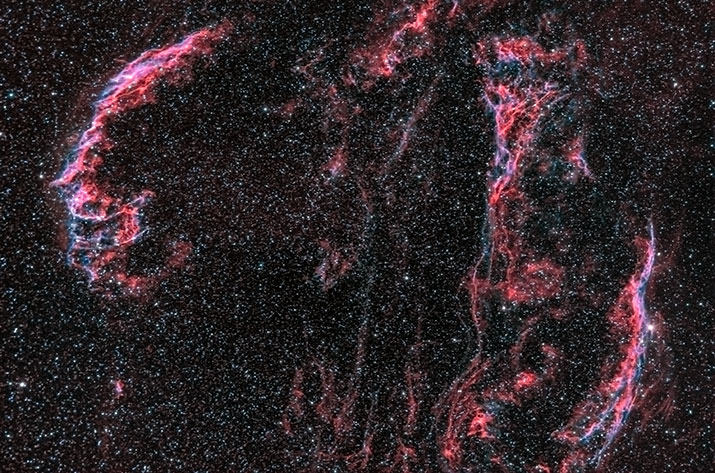
|
Date: July 11 & 26, 2017 Location: Dark Sky Observatory - Davis Mountains, TX Telescope: TeleVue Genesis 102mm - Camera: STL-6303 - Mount: Paramount MyT Exposure: Ha = 100 min. - OIII = 200 min. - (20 min sub-exposures binned 1X1) Image Credit: Preston Starr & Donald Waid Click on the image below to view at higher resolution. |

|
The Veil Nebula, a supernova remnant, is located in the constellation Cygnus - The Swan. The distance to the Veil is somewhat uncertain. Recent studies estimate the nebula lies a maximum distance from the Earth of 1,470 light years. This is much closer than previous estimates of approximately 2,500 light years. The entire Veil Nebula, known as the Cygnus Loop, is very large and spans an area approximately the width of 6 full Moons. The Veil consists of three main parts. Starting on the left in the image above is the Eastern Veil, at 1 o'clock - Pickering's Triangle, and at 5 o'clock - the Western Veil. (Commonly called the Witch's Broom.) According to current estimates, the star that gave birth to the Veil exploded between 5000 and 8,000 years ago. Astronomers have determined the supernova explosion had a peak brightness of -8 magnitude. This would be about as bright as a crescent moon. It would have been a spectacular sight! Supernova explosions seed interstellar space with heavy elements which new stars, and their planets, incorporate when they are born. Life, as we know it, could not have developed without the heavy elements created in the cores of stars like the one that formed the Veil Nebula. The image above was captured using Ha (Hydrogen Alpha) and OIII (Doubly Ionized Oxygen) narrowband filters. The image was assembled by mapping Ha to red and OIII to green and blue. A full narrowband version (Hubble Palette Colors) of the Veil may be viewed here. 1 https://en.wikipedia.org/wiki/Veil_Nebula
|